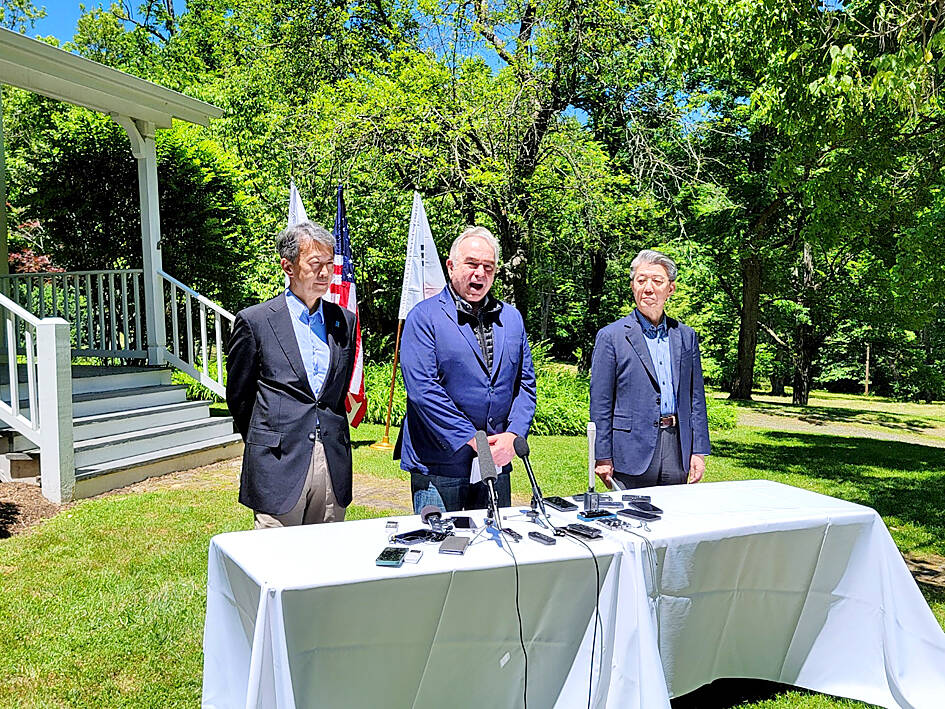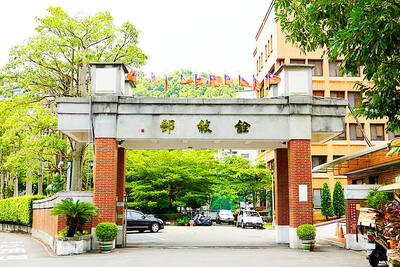US Deputy Secretary of State Kurt Campbell on Thursday voiced the US’ strong concern over China’s “destabilizing actions” around Taiwan and in the Taiwan Strait in a meeting with a Chinese official, saying that they “erode the status quo that has maintained regional peace and stability for decades.”
The US State Department described Campbell’s discussion with Chinese Vice Minister of Foreign Affairs Ma Zhaoxu (馬朝旭) in Washington as “candid and constructive,” and “part of ongoing efforts to maintain open lines of communication between the United States and PRC” (the People’s Republic of China).
The Chinese People’s Liberation Army (PLA) held large-scale military exercises in areas surrounding Taiwan on Thursday and Friday last week, three days after the inauguration of President William Lai (賴清德).

Photo: EPA-EFE
Beijing has also increased its number of military incursions, including crossing the unofficial maritime border, the median line of the Taiwan Strait, and entering Taiwan’s southwestern air defense identification zone.
During their meeting, Campbell also raised the US’ “serious concerns about PRC support to Russia’s defense industrial base undermining European security, and the PRC’s destabilizing actions in the East China Sea and South China Sea, including at Second Thomas Shoal” (Renai Shoal, 仁愛暗沙), the US State Department said in a statement.
“The Deputy Secretary emphasized that although the United States and PRC are in competition, both countries need to prevent miscalculation that could veer into conflict or confrontation,” the statement said, adding that both sides reaffirmed “the importance of maintaining open channels of communication at all times and committed to continue diplomacy and consultations.”
Separately, Campbell on Friday hosted a meeting attended by Japanese Vice Minister of Foreign Affairs Masataka Okano and South Korean Vice Minister of Foreign Affairs Kim Hong-kyun.
“We reaffirmed the importance of maintaining peace and stability across the Taiwan Strait as an indispensable element of security and prosperity in the international community,” said a joint statement issued after the meeting, which also called for the peaceful resolution of cross-strait issues.
The joint statement also “strongly condemned North Korea’s recent launches using ballistic missile technology.”
“We reaffirm our commitment to use our collective capacity to strengthen security and maintain peace and stability across the Indo-Pacific region,” it said, adding that the US, Japan and South Korea “strongly oppose any unilateral attempts to change the status quo in the waters of the Indo-Pacific.”
In other news, Canadian Minister of National Defence Bill Blair yesterday said he had also expressed concern about Chinese military action around Taiwan since the Taiwanese presidential election in January during his meeting with Chinese Minister of National Defense Dong Jun (董軍), held on the sidelines of the Shangri-La Dialogue defense summit in Singapore.
Canada would increase its presence in Asia, Blair said.
Additional reporting by Reuters

Taiwan Semiconductor Manufacturing Co (TSMC, 台積電) is expected to start construction of its 1.4-nanometer chip manufacturing facilities at the Central Taiwan Science Park (CTSP, 中部科學園區) as early as October, the Chinese-language Liberty Times (the Taipei Times’ sister newspaper) reported yesterday, citing the park administration. TSMC acquired land for the second phase of the park’s expansion in Taichung in June. Large cement, construction and facility engineering companies in central Taiwan have reportedly been receiving bids for TSMC-related projects, the report said. Supply-chain firms estimated that the business opportunities for engineering, equipment and materials supply, and back-end packaging and testing could reach as high as

CHAMPIONS: President Lai congratulated the players’ outstanding performance, cheering them for marking a new milestone in the nation’s baseball history Taiwan on Sunday won their first Little League Baseball World Series (LLBWS) title in 29 years, as Taipei’s Dong Yuan Elementary School defeated a team from Las Vegas 7-0 in the championship game in South Williamsport, Pennsylvania. It was Taiwan’s first championship in the annual tournament since 1996, ending a nearly three-decade drought. “It has been a very long time ... and we finally made it,” Taiwan manager Lai Min-nan (賴敏男) said after the game. Lai said he last managed a Dong Yuan team in at the South Williamsport in 2015, when they were eliminated after four games. “There is

Democratic nations should refrain from attending China’s upcoming large-scale military parade, which Beijing could use to sow discord among democracies, Mainland Affairs Council Deputy Minister Shen You-chung (沈有忠) said. China is scheduled to stage the parade on Wednesday next week to mark the 80th anniversary of Japan’s surrender in World War II. The event is expected to mobilize tens of thousands of participants and prominently showcase China’s military hardware. Speaking at a symposium in Taichung on Thursday, Shen said that Chinese Minister of Foreign Affairs Wang Yi (王毅) recently met with Indian Prime Minister Narendra Modi during a visit to New Delhi.

FINANCES: The KMT plan to halt pension cuts could bankrupt the pension fund years earlier, undermining intergenerational fairness, a Ministry of Civil Service report said The Chinese Nationalist Party (KMT) caucus’ proposal to amend the law to halt pension cuts for civil servants, teachers and military personnel could accelerate the depletion of the Public Service Pension Fund by four to five years, a Ministry of Civil Service report said. Legislative Speaker Han Kuo-yu (韓國瑜) on Aug. 14 said that the Act Governing Civil Servants’ Retirement, Discharge and Pensions (公務人員退休資遣撫卹法) should be amended, adding that changes could begin as soon as after Saturday’s recall and referendum. In a written report to the Legislative Yuan, the ministry said that the fund already faces a severe imbalance between revenue